L’Enfer
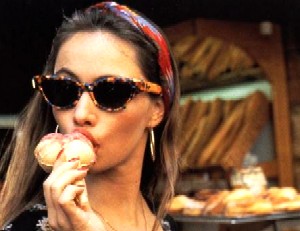
L’Enfer threatens to have a more interesting backstory than the film itself. Originally written by director Henri-Georges Clouzot (Diabolique) in 1964, Clouzot made several attempts to make the film, but always had problems with the structure, and needlessly elaborate fantasy sequences. Thirty years later, Clouzot’s widow sold the script to a producer, who offered it to Claude Chabrol, known as the French Hitchcock, who coincidentally had regularly played cards with Clouzot when he was still living.
Normally, I find Chabrol to be supremely overrated, his films are all very similar to each other, and they lack distinguishing details and often seem to have little at stake. But L’Enfer, which translates as Hell, is different because Chabrol took the meat of Clouzot’s story and applied his own skills to it. It’s a complete film because each contributor compliments the other, and covers up their normal weaknesses.
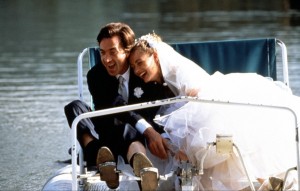 Essentially, L’Enfer is a boring domestic drama rethought of as a thriller. A man, Paul, meets Nelly, just as he’s building a cozy and intimate hotel. We skip ahead several years; they’ve fallen in love and gotten married. Chabrol skips ahead again with fade outs, and now they have a child, then they are running a successful hotel with many return customers. The movie then begins with the usual subtle accusations between couples, as Paul is often wondering where exactly his wife has been, why she is visiting her mother, why was she in the basement, things like this. What at first seems like banal and typical actions by Paul soon escalates and he grows more and more jealous. The key is that Nelly is played by Emmanuelle Béart, who is so gorgeous and naturally flirtatious with her body, that you believe that a husband would get overly protective, fearing that she might leave at any moment, with any man.
Essentially, L’Enfer is a boring domestic drama rethought of as a thriller. A man, Paul, meets Nelly, just as he’s building a cozy and intimate hotel. We skip ahead several years; they’ve fallen in love and gotten married. Chabrol skips ahead again with fade outs, and now they have a child, then they are running a successful hotel with many return customers. The movie then begins with the usual subtle accusations between couples, as Paul is often wondering where exactly his wife has been, why she is visiting her mother, why was she in the basement, things like this. What at first seems like banal and typical actions by Paul soon escalates and he grows more and more jealous. The key is that Nelly is played by Emmanuelle Béart, who is so gorgeous and naturally flirtatious with her body, that you believe that a husband would get overly protective, fearing that she might leave at any moment, with any man.
Another important factor is that Béart never gets naked, as she has in virtually every one of her roles. Since the film is about how Paul either imagines or really sees his wife cheating on him, it is more important that her nudity is suggested, both to Paul and to the audience. It is both a tease for us and for him. The more fanciful his accusations become, the more realistic the film becomes. Paul is someone who wants all his worst fears confirmed and won’t stop until they are. It’s almost like he can’t believe his luck and he has to become self-destructive to be happy.
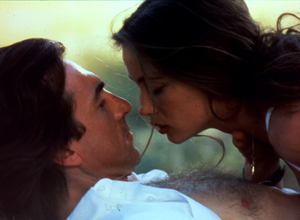 The way Chabrol has set the whole thing up is quite ingenious. The use of short blackouts is very important, as it lulls you into a false sense of complacency, and the slower Chabrol moves, the more effective he is. By having time jump forward and then stop just as the couple hits a rough patch, it provides the feeling of how happiness flies by, but misery is condensed and stretched out, even if it’s a smaller amount of time. The first sections are like bullet points in his life, hotel, wife, kid, building up clientele, etc. Then it’s just one scene after another of accusations.
The way Chabrol has set the whole thing up is quite ingenious. The use of short blackouts is very important, as it lulls you into a false sense of complacency, and the slower Chabrol moves, the more effective he is. By having time jump forward and then stop just as the couple hits a rough patch, it provides the feeling of how happiness flies by, but misery is condensed and stretched out, even if it’s a smaller amount of time. The first sections are like bullet points in his life, hotel, wife, kid, building up clientele, etc. Then it’s just one scene after another of accusations.
This is a movie that will make you squirm, because some things feel too realistic, and when you watch the Paul character, who you have invested time getting to sympathize with, making foolish choices and willfully misinterpreting situations, it is hard not to wince. As the movie progresses, Chabrol uses more and more split focus shots, which while alienating Paul from everyone else, and letting him live in his head, really allows us to understand his perspective. This leads to a fantastic ending that never goes in the direction you think it will, with a final bit that had me laughing with its bitter and darkly comic final joke.
That’s not to say that everything in the film is perfect. One of the things that Chabrol retained from the original script was Paul’s inner voice (Chabrol talks in the extras of trying to remove as much inner thought as possible that was in the initial Clouzot’s screenplay), which tells him what to do. This may have been a novel concept in 1964, but to hear his inner voice speaking out loud is quite silly, as if it was a horror movie whose killer is motivated by “something inside him that tells him to kill.” But this one issue only slightly detracts from the film. L’Enfer is a fascinating study of how someone’s insecurities can not only dictate their lives but everyone around them, and how they grasp onto anything they can, even if it is as flimsy as public perception to mask their slipping sanity.
This is a review of the British R2 PAL disc of L’enfer.
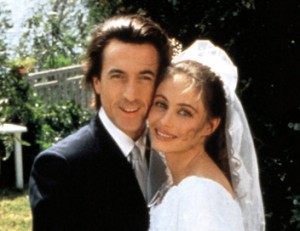 Video:
Video:
Presented in anamorphic widescreen 1.66, with mild window boxing, the transfer won’t blow you away as it suffers from the soft, smeared, and vague look of a lot of low budget European films, as if the material itself is hazy. That said, it’s certainly adequate and the subtitles are clear and concise, and I noticed no color bleeding, and this looks no different from any other Chabrol films I’ve seen, reminding me specifically of The Swindle.
Audio:
Since this is almost entirely a dialogue only film, the 2.0 sound rarely accesses the rear speakers, and mostly resides in the center channel. I had no complaints and the sound effects were rendered with clarity.
Extras:
This disc is a direct port from the French R2, and so the interviews and commentaries are the same, except that English subtitles have been added. There is an interview with Chabrol, which is eleven minutes long and covers the history of the script, that Clouzot struggled to bring the film to fruition by making the story too complicated, far more explicit than needed, and using a flashback structure, which of course would have ruined the slow build of the film, especially if you already know the outcome, as well as missing the point of the mindset of the main character. Chabrol covers what ideas he felt like keeping, and some which he thought would be outright stealing to use
There is a section called Presentation which is more in depth about the history of the film and is narrated and accompanied with stills from the film. It plays like a press kit description and is three minutes long.
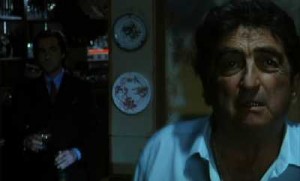 There is a commentary on a few important scenes totaling thirty eight minutes, but they are not as part of the film, but a separate extra within the menu, with occasional shots of Chabrol in a booth. He focuses on a lot of things which I read differently, proving that he was actually interested in portraying more fantastical elements that Clouzot had suffered trying to get across, rather than the more realistic approach that I took it as.
There is a commentary on a few important scenes totaling thirty eight minutes, but they are not as part of the film, but a separate extra within the menu, with occasional shots of Chabrol in a booth. He focuses on a lot of things which I read differently, proving that he was actually interested in portraying more fantastical elements that Clouzot had suffered trying to get across, rather than the more realistic approach that I took it as.
Overall:
L’Enfer is a deceptively unnerving and effective thriller that benefits from having two diametrically opposite approaches adding to the script. The video and sound won’t blow you away but are not distractions and the extras add tremendous depth and understanding to the film.



